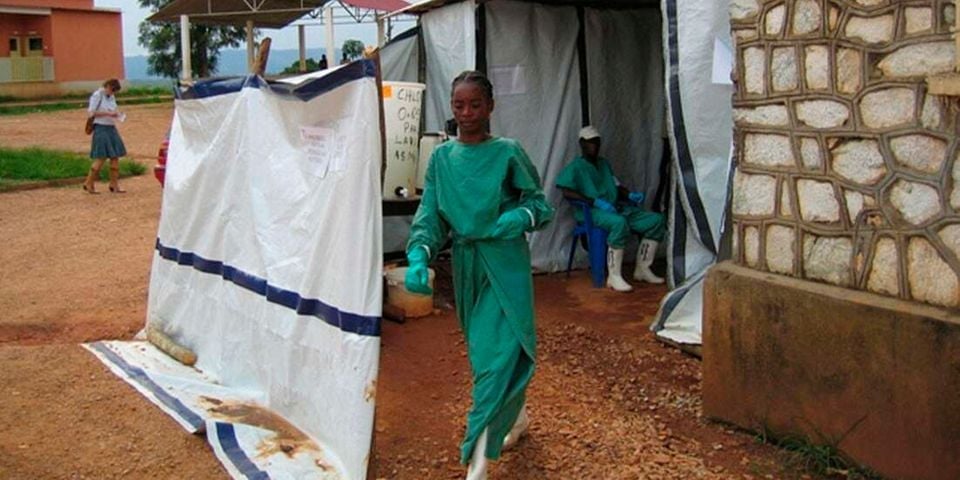Prime
Marburg: Govt starts screening at borders

A Uganda Redcross Society staff checks the documents of a traveller at Mutukula border post on March 22, 2023. PHOTO | ISSA ALIGA
What you need to know:
- The World Health Organisation says illness caused by Marburg virus begins abruptly, with high fever, severe headache and severe malaise.
- Severe watery diarrhoea, abdominal pain and cramping, nausea and vomiting can begin on the third day.
Uganda has ordered immediate screening and testing at its southern border following an outbreak of Marburg virus that has killed five people in Bukoba, Tanzania.
Mr Emmanuel Ainebyoona, the spokesperson of the Ministry of Health, yesterday said screening and testing is being done at Kasensero and Mutukula border points.
Tanzanian authorities have confirmed that the disease broke out in Bukoba and Kagera a few days ago.
Following the outbreak, health teams have been deployed and put on high alert at border crossings in the districts of Kyotera and Isingiro.
As of yesterday morning, Tanzania had recorded eight cases. Of these, five, including a health worker, have died in Kagera.
The Tanzanian government said the three other confirmed cases were receiving treatment while 161 contacts have so far been identified and are being monitored.
The Kyotera District Health Officer, Dr. Edward Muwanga, in an interview with the Daily Monitor yesterday, said the government has already put in place measures to prevent the spread of the virus into Uganda.
“With help from the Ministry of Health, a rapid response field team has already been deployed to thoroughly screen whoever enters Uganda through border posts. We are also working with security agencies to prevent entries at the porous border routes.”
He added: “Starting today [Wednesday ] all the health workers in the two districts are going to be retooled on how to handle emergency cases and an emergency rapid response plan has also been developed. ”
Mr Aaron Turahi, the chairperson Isingiro District, said as a district, they have put the task force on epidemics on high alert.
“We have held three meetings so far to intensify our readiness to contain the disease in case it spreads this side. Our Village Health Teams have been put on alert to report any signs in relation to the epidemic, but we have also sensitised the communities.”
He added: “ Rwekubo Health Centre IV, which used to accommodate Covid-19 victims, has also been prepared to receive and manage any suspects.”
But some residents at the Mutukula border are scared of contracting the disease because of the big number of travellers and traders.
There has been an increase in volumes of transit cargo through Mutukula, which became a one- stop border post in 2017. It operates 24 hours daily.
Mr Abdul Mwanje, another resident and trader, urged the health teams to be more vigilant during surveillance.
“We pray that we don’t experience what we went through during the Covid-19 period, it was worse,” he said.
Prevention
The World Health Organisation and the US Centers for Disease Control say preventive measures against Marburg virus infection are not well defined, as transmission from wildlife to people remains an area of ongoing research. However, they ask people to avoid fruit bats and sick non-human primates to protect against infection.
They also urge the public to prevent direct physical contact with a Marburg patient or suspect by wearing protective gowns, gloves, and masks; placing the infected individual in strict isolation; and sterilisation or proper disposal of needles, equipment, and patient excretions.
Currently, handwashing is mandatory for all travellers from Tanzania through various border posts like Mutukula, Minziro, Kasensero in Kyotera District and in Kikagate, Bugango and Buhunga in Isingiro District.
Previous outbreaks in Uganda
Two deaths were recorded in Kween District in 2017, while 15 cases, including four deaths in Ibanda and Kabale districts were recorded in 2015.
In 2008, Uganda recorded two unrelated cases of travellers returning to the Netherlands and USA after visiting caves in Western Uganda.
Compiled by Ambrose Musasizi, Isa Aliga, Rajab Mukomboozi




